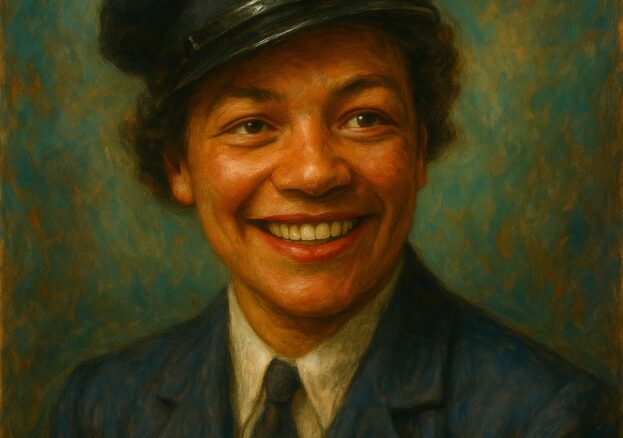
Lilian Mary Bader (1918–2015) was one of the first Black women to serve in Britain’s armed forces and later became a respected teacher and role model. Her life reflects a journey of resilience, service, education, and determination, overcoming barriers of race and gender in a society that often tried to hold her back.
Lilian was born in Liverpool in 1918 to Marcus Bailey, a Barbadian merchant seaman who had served in the First World War, and an Irish mother. Her childhood was marked by hardship. When she was just nine years old, both her parents died, and she was placed in a convent. Life there was strict, opportunities were limited, and as a mixed-heritage child in interwar Britain she often faced prejudice. Yet Lilian’s determination and independence were already clear.
At the outbreak of the Second World War in 1939, she was keen to serve her country. She found work with the Navy, Army and Air Force Institutes (NAAFI), which provided food and supplies to servicemen. However, when it was discovered that her late father had been born in the Caribbean, she was dismissed. This was a common experience for Black Britons in the armed forces — institutions often blocked or restricted service because of race. But Lilian did not give up.
In 1941, her persistence paid off when she was accepted into the Women’s Auxiliary Air Force (WAAF). There she trained as an instrument repairer, responsible for maintaining the delicate technology that kept Britain’s aircraft operational. It was a highly skilled trade, and she quickly impressed her superiors. She became one of the first women — and certainly one of the first Black women — to qualify in that specialism. Rising to the rank of corporal, she supervised younger recruits and gained the respect of those she worked with. Her achievements broke through the twin barriers of race and gender at a time when opportunities for women of colour in Britain were vanishingly rare.
Her service also gave her confidence and pride. Reflecting later in life, she said: “Out of war came fulfilment. I was able to prove my worth. The barriers were down, and I was serving my country too.” For Lilian, the war was a turning point that allowed her to demonstrate her abilities and prove to herself and others that she could succeed.
When the war ended, she left the WAAF in 1944 and married Ramsay Bader, a soldier who had also served in the Army. They settled in Yorkshire and raised two sons, including Geoff, who followed in his parents’ footsteps and became a pilot in the Royal Air Force. Lilian dedicated herself to her family, but she was not content to stop there. Once her children were older, she pursued the education that had been denied to her as a child.

She studied at London University, where she earned a degree in history — a remarkable achievement at a time when few women of her background went into higher education. With her degree, she trained as a teacher and embarked on a second career in education. As a teacher, she inspired young people with her knowledge and her determination, proving that the same resilience she had shown in wartime service could be applied to the classroom.
Lilian lived a long life, passing away in 2015 at the age of 97. In her later years she often spoke about her experiences of racism, her pride in serving her country, and the importance of education. She was increasingly recognised as a pioneer. Her story was featured in the Royal Air Force Museum’s Pilots of the Caribbean exhibition, which celebrated the contributions of Caribbean men and women to the RAF. She was also included in the Oxford Dictionary of National Biography, securing her place in the official record of Britain’s history.
Today, Lilian Bader is celebrated every year during Black History Month as one of the trailblazers of Black British history. Her story highlights that Britain’s war effort was diverse and multi-ethnic, and that women of colour had a vital role in shaping the nation during and after the conflict. She demonstrated that prejudice could be challenged through perseverance, that education could transform lives, and that service to one’s country could be an act of pride as well as duty.
From a convent orphan to a RAF technician, graduate, and teacher, Lilian Bader’s journey is extraordinary. She stood firm with pride, proving her worth again and again, and left behind a legacy that continues to inspire.
References & Further Reading
RAF Museum – Technician Leading Aircraftwoman Lilian Bader
https://www.rafmuseum.org.uk/research/online-exhibitions/pilots-of-the-caribbean/heroes-and-sheroes/technician-leading-aircraftwoman-lilian-bader/
Wikipedia – Lilian Bader
https://en.wikipedia.org/wiki/Lilian_Bader
Stephen Bourne – Mother Country: Britain’s Black Community on the Home Front 1939–45
https://thehistorypress.co.uk/publication/mother-country/9780750990834/
Stephen Bourne – Black Poppies: Britain’s Black Community and the Great War
https://thehistorypress.co.uk/publication/black-poppies/9780750990834/
